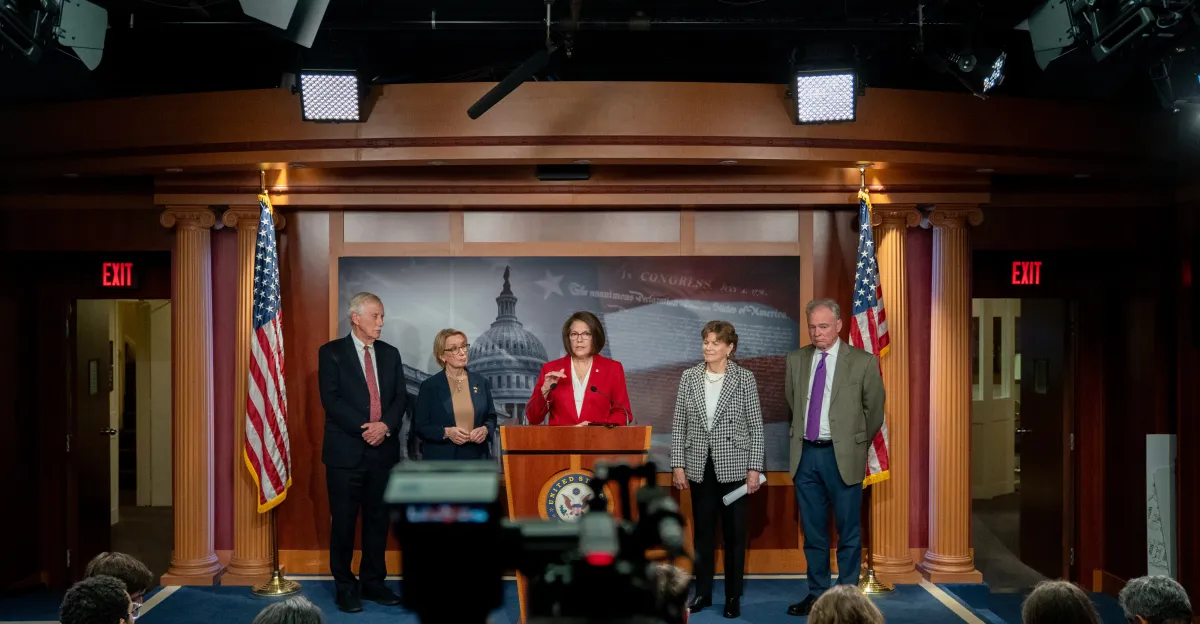Copyright Vox.com

The longest government shutdown in modern American history is about to end, after a handful of Democratic senators this weekend decided to provide Republicans enough votes to pass a short-term funding plan that would keep the government running until the end of January 2027. While there’s not much for Democrats to write home about in this deal, it’s also not clear that they could have ever really won the showdown — or any of the concessions they were originally making. Moreover, the deal doesn’t put the issue to bed so much as it kicks the can down the road for a few months — through January — before another vote to fund the government will be needed. That leaves a question: Will the country find itself facing another shutdown in just a few months’ time? For answers, I turned to Matt Grossman, the director of the Michigan State University’s Institute for Public Policy and Social Research, as well as the host of the Science of Politics podcast at the Niskanen Center, where he’s a senior fellow. Grossman is an expert on Congress, policymaking, and partisan politics, and I found his perspective both clarifying and grounding. This conversation has been edited for clarity and length. The basics of the deal The short-term plan doesn’t extend Affordable Care Act tax credits that are set to expire at the end of 2025. It does include a promise from Republicans to vote in the next few weeks on a Democratic health care bill that would likely include an extension of these credits. It’s not clear this could become law, however. It provides full-year funding of military construction and veterans programs, congressional salaries and their offices, and SNAP and other assistance programs through the US Department of Agriculture. It temporarily extends funding for the rest of the government until January 30. It reverses shutdown-pegged layoffs of federal works (“reductions in force”) and ensures backpay for furloughed workers. Was this shutdown appreciably or qualitatively different from previous ones? This shutdown was different, because the Democrats were trying to win policy concessions and were strategizing about using the shutdown to do so beforehand. That’s rare. It’s usually Republicans who instigate shutdowns and call for policy concessions. The last time something like this happened was in 2018, when the Democrats tried to win concessions on DACA [the federal program that extended protections for undocumented people brought to the US as children], but that only lasted a couple of days. This one was a long shutdown and one where the Democrats were trying to win concessions. That is the difference. What is your understanding of the argument for striking a deal that Democratic senators have made? Do you find it persuasive? There’s not a ton of obvious logic to the deal, but this is typically how shutdowns end. You just don’t have a record of winning concessions on the basis of reopening the government. You tend to just get process agreements to move forward. So, that’s what happened here. That said, I don’t think you can just evaluate the end of the shutdown; you have to evaluate the shutdown as a whole. And there, it’s hard to say that it was a worthwhile policy project for the Democrats to pursue. Were there specific political gains that made the shutdown worth it? I’m somewhat skeptical. Defenders of the deal argue that the harm an extended shutdown would impose wasn’t worth the potential gains. What do you think of that case? There’s no question that a shutdown is bad policy and it leads to harm. It doesn’t really gain anything. Republicans are often in the situation where they’re saying, “Oh, well it’s not so bad for the government to be shut down,” but then, we end up just paying people, including those people who weren’t working, so it doesn’t really save money. It causes people to delay or lose benefits, and it causes disruptions to all kinds of services. So, it isn’t good policy. I don’t think anyone thinks that it is. The issue here is Democrats thought that they were doing pretty well in messaging — that they were winning in public opinion of polls of who was to blame for the shutdown, that they did well in the [off-year] elections — without seeing harm from the strategy. So, there were people saying, “Why give in now?” What’s the argument for giving in now? That there wasn’t much of a prospect for winning the policy concessions or winning a change in a process. And so, some senators saw now as the best time to end the shutdown. I take their word for it — that they were actually concerned about the policy implications of the shutdown — but if they were going to give in now, it would have made more sense to strike this deal before the shutdown ever began. So, in that sense, they haven’t really gained anything. So do you think it’s fair to describe this as Democrats “caving”? Yeah, totally. Democrats had demands; they were not met. They agreed to open the government anyway. But that should be expected. That’s what almost always happens. We obviously have a few federal experiences. We also have state experiences where shutdowns, again, don’t succeed in winning policy concessions. Republicans have had to repeatedly learn this lesson, and Democrats are learning it. Again, the trouble is you always can say, “Well, they should have held out longer and harder, and then, they would’ve gotten some concessions,” and Republicans went through several rounds of thinking that, as well. But the overall experience — on the national and state levels — is that you don’t really win policy concessions through shutdowns. There’s a lot of talk online about the idea that this deal is a betrayal of the “base.” Can you help us better understand who the base for the party really is and whether they’ll indeed feel betrayed? There’s a difference between the people who commentate about politics and people who are base voters in a party. Sometimes, we assume they’re the same. Certainly the voting base of the Democratic Party also wants the Democrats to do more to fight Trump. They viewed the March capitulation as a problem. This shutdown was born of that, and you could say was a response to informed voters in the Democratic base, as well as the commentariat. But the difficulty is that these voters are never going to be happy. They felt betrayed when there was no shutdown. They felt betrayed when there was a shutdown that ended with Democrats caving. And so, the only circumstance in which they wouldn’t feel betrayed is if they had won concessions through a shutdown — which, as I keep saying, just doesn’t usually happen. I’m not sure there was a no-betrayal outcome here. Certainly, the college-educated white liberals are well represented in the online discourse about the shutdown and are better represented than other parts of the Democratic base. And I’m sure they were overrepresented in the prominent people calling for a shutdown. But one difference this year is that Democrats of all kinds want their leadership to obstruct more, which is more typical of how Republicans tend to feel under Democratic presidents. That’s why you’re seeing Republican-style behavior among members of Congress in the Democratic Party, because [they’re] responding to those same kinds of polls. Do you think we’ll be back in a similar situation when this deal runs out in January? First is the question of how much work is done in the interim. There are actual appropriations processes where the parties are trying to reach agreement. In those negotiations, it is possible that Democrats will be able to move some things in their direction such that they feel a little more satisfied. It’s possible that they’ll be able to do more of those kinds of restrictions on presidential action in actual appropriations bills that they pass before January. But even if they do win those restrictions, that will be because there are Republican senators who also want those outcomes. And probably the way to get that is before any shutdown is imminent. So there’s some possibility of movement there before January. If we get back to the same situation, certainly there will be pressure again to shut down. But we’ve now been through one circumstance where the base and Democratic commentators were upset that they didn’t go for a shutdown. And we’ve been through one circumstance in which Democrats got behind the longest shutdown in history — and their voters are still unhappy with the outcome. So, the question will be, if this debate comes up for a third time, is there a foreseeable path to winning some kind of concession or restricting presidential control of appropriations through a shutdown? What do you expect? I think the answer is probably still no. But that doesn’t mean that people will agree with me. One other piece of this is how Democrats and Democratic Party leaders treat the senators that caved here. In other words, if you know a Democratic cave is coming, and it’s just a question of whether the cave comes in a week or a month, then it’s not clear that it is really worth shutting down the government again. If they somehow convince themselves that they have a better, longer-term strategy for holding this time, then maybe we’ll see a shutdown again.



